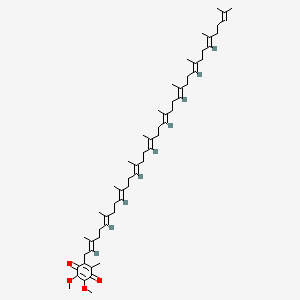抗氧化劑、肌膚調理劑,屬油溶性物質,主要保護生物體的細胞膜與脂肪層,並有部份護膚功效[3]。外用時主要價值在於『抗氧化』,如防禦紫外線傷害、阻止自由基對健康細胞的攻擊,對皮膚的抗氧化貢獻與維他命E、多酚類、異黃酮相似,但Q10分子量(863)較上述物質大,選擇抗氧化產品,實在不必單戀Q10[4]。
Ubiquinone 為氧化型Q10,亦為目前幾乎全部品牌用的Q10;Ubiquinol 為還原型Q10,判讀上認為它才是真正具生物輔酶活性,具捕捉自由基的功能,但很不安定[5]。
[2] Matthews, R. T.; et al. (July 1998). \"Coenzyme Q10 administration increases brain mitochondrial concentrations and exerts neuroprotective effects\". PNAS 95: 8892-8897. Retrieved on 2006-12-01.
[3] 張麗卿,『優質保養品選擇策略』,聯經出版社,2003/07/10。
[4] 張麗卿,『我就是化妝品化達人』,健行出版社,2007/04/10。
[5] 『Q10護膚價值,真的可以坦白說嗎?』,我是張麗卿老師部落格,2007/10/28。

輔酶Q10又稱泛醌,是一種強親脂性抗氧化劑,它在化妝品中作抗氧化劑、保濕劑和皮膚調理劑使用。存在於心髒、腎髒、肺肝、肌肉等重要髒器和皮膚細胞中,是線粒體電子傳遞和氧化作用的重要介質,參與代謝,為細胞提供能量,提升細胞活力。作為一種小分子物質能夠很容易穿透肌膚,起到提高皮膚修複再生能力,減少自由基損傷,達到抗衰老的作用。它對於預防光老化和皺紋有很好效果,特別是眼部的魚尾紋。其作用機理為:參與細胞的基本生化反應,主要作用於氧化磷醯化反應中的電子傳導,其分子中的苯醌結構能可逆地加氫還原而形成對苯二酚的衍生物,是生物氧化反應中的一種“遞氫體”輔酶,主要能提高皮膚的生物利用率。輔酶Q10遇光易分解,如波長為360nm的紫外線或透經玻璃的光,顏色就會變深;也易被堿破壞,焦性沒食子酸可抑製堿對輔酶Q10的傷害。目前為止,未見輔酶Q10外用不安全的報道。
Thanks to Nivea, Q10 is a pretty well-known ingredient and the fame and Beiersdorf's (the parent company of Nivea) obsession with it are not for no reason. It's an antioxidant found naturally in human cells where it plays a big role in energy production.
In fact, it's so important for energy production that if taken as an oral supplement it has a caffeine-like effect and if taken at night you will probably not sleep very well (so you should take it in the morning). Q10 supplementation is not a bad idea: it not only gives you energy but research also shows that oral Q10 increases the Q10 level of the skin (of course, it decreases with age like pretty much every good thing in the skin) and may help to reduce wrinkles.
